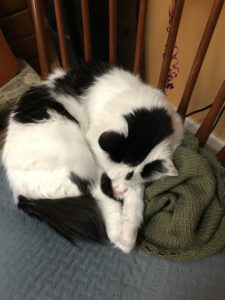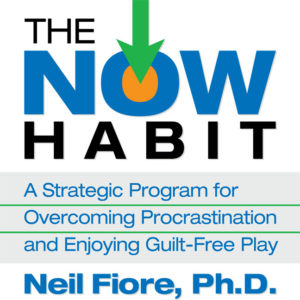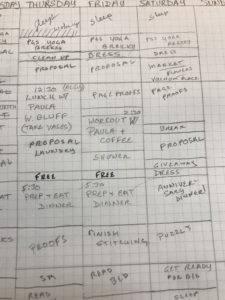Procrastination is so rife among my writer friends and other creatives I know that we don’t even joke about it. We are clichés. While I would never lie about procrastinating when I’m supposed to be working, I rarely volunteer the fact. If another writer confesses to me that she’s procrastinating on getting pages done, I feel a huge sense of relief. There’s no misery like procrastination misery to build solidarity between writer friends.
Even some of the most productive bestselling writers I know sometimes procrastinate. Personally, when I’m in my deepest procrastination moments, I forget that. It feels lonesome, and I become my own harshest judge. (That whole comparing oneself to other writers is deadly too, but we can consider that another time.) Being judgy while procrastinating is doubly unhelpful.
Procrastination offers an escape from tension. If I have a project (or chapter or paragraph or phone call or chore) that makes me feel anxious, I sometimes literally walk away from it. It might be for five minutes. It might be for an hour. It might be for weeks. Eventually I’ll return to it–or, if it’s some kind of chore or event–my lack of action will mean it expires and goes away.
Avoidance. It’s embarrassing to admit that I’m sometimes guilty of it. Ouch.
I’ve read many, many books to try to improve my productivity, shape my behavior, and, yes, fix my procrastination habit. Because it is a habit, not a disease or fatal flaw.
Here’s the latest book I’ve read on the subject:
I listened to it on audio via Overdrive and liked it well enough that I bought the ebook. (I often do that, anecdotal proof that library reads influence consumer book purchases.)
Notice that appealing subtitle. “A Strategic Program for Overcoming Procrastination and Enjoying Guilt-Free Play.” How sexy is that? I couldn’t resist checking it out when I was browsing available audiobooks. The subtitle worked on me exactly the way I’m sure it was intended: put the focus on the positive, not the procrastination.
KillZone is not the place for book reviews, but is about the writing life. So I’ll be brief.
THE NOW HABIT
- Helps you identify when and why you might be procrastinating.
- Doesn’t judge you for procrastinating–and even explains how it becomes an active coping tool.
- Doesn’t prioritize work over pleasure (a real revelation for me).
- Offers some compelling client stories.
- Has focus exercises and talks about the process and importance of flow.
- Helps you create your own “unschedule.”
- Has a good section about dealing with the procrastinators in your life.
- Explores goal setting.
The “unschedule” is my favorite piece of the process because it turns one’s schedule upside down. After blocking out the time you require for life’s necessities like eating, cleaning, sleeping, and tending dependent creatures, you mark out time for things that give you pleasure and put you in a state of play or creative play. Working out, practicing hobbies, spending time with friends. It might happen daily, weekly, or bi-weekly. Whatever you choose. It becomes a priority. A reward to work toward.
Work (or writing or publishing business for most of us here) can become more energizing. More efficient. I confess that on the days I’ve managed to put this into serious practice, I’ve found myself happily working overtime, sometimes working well into my scheduled pleasure time–but not feeling a bit deprived because I know I’ll get to play again soon. Also, I’m getting a huge amount of pleasure from my work hours.
I know many people who have always operated their lives this way. They tend not to be procrastinators, and are what Fiore calls “producers.” If you are one of those people, you either stopped reading this a long time ago, or are shaking your head, wondering what’s wrong with the rest of us. Congratulations! You are in a really good place.
I’ll give you a peek at a part of my “unschedule” from last week. Up to last month, my two primary jobs were writer and homeschool mom. Now I’m a writer with a rising college freshman in the house, so my time is primarily mine to schedule. Everyone’s life circumstances are different, so your mileage will vary.
I make my schedule in pencil because it never works out exactly as I plan and I like to go back and put in what I actually do. It’s quite revelatory for me.
Dealing with procrastination can be a real battle. Particularly for writers. Not all, of course. I’d love to hear from both sides of the aisle. What do you do to fight procrastination, if you fight it at all? If you don’t, what keeps you focused on your goals?

(I won’t tell you how many times I got up from my chair and wandered out into another part of the house as I wrote this. But here’s what happens if I’m gone for even a minute!)


